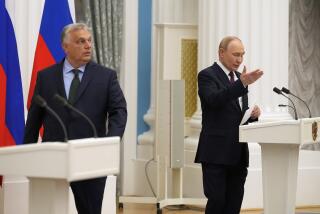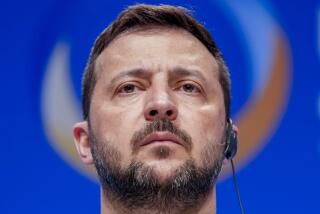Gorbachev Visit Sparks Hopes for ‘Renewal’ in Poland : Soviet Leader Due in Warsaw Today; Intellectuals See Him as Genuine Force for Reform
- Share via
WARSAW — Soviet leader Mikhail S. Gorbachev begins a six-day visit to Poland today on a trip that Polish leaders hope will give a boost to the stalled economic and political “renewal” here.
In an unusual note of harmony with the nation’s official leadership, Polish opposition intellectuals are also welcoming the Gorbachev visit, since they view the Soviet leader as representing the first genuine force for reform in 40 years of Communist rule in Eastern Europe.
However, ordinary Poles, weary of promises of reform and beset by rising prices and a falling standard of living, seem so far uninspired by the prospect of the Gorbachev trip. Many of them view him as one more agent of the domineering power that imposed on Poland an obviously faltering Communist system.
Officials here say they are heartened that Gorbachev is arriving so soon after his apparent successes at the Communist Party conference in Moscow.
“Soviet perestroika (political and economic restructuring) helps Polish renewal, and vice versa,” said Stefan Staniszlewski, Poland’s foreign affairs spokesman.
Change in Attitude
Krzysztof Sliwinski, a Roman Catholic journalist closely allied to the banned Solidarity trade union, said some Polish opposition figures indicate a change in attitude toward the Soviet leadership.
“Active people in Poland have abandoned totally their anti-Soviet mood,” he said. “Rather, they are in a mood not to make too much of a problem for Gorbachev.”
A harassed clerk at a downtown hotel, processing guests arriving for the Gorbachev visit, seemed to sum up the more jaded mood of the general public.
“What’s the big deal?” He said. “It’s just another Russian big shot.”
Polish officials say public opinion surveys indicate that Gorbachev enjoys wide popularity here, although antipathy between Russians and Poles dates to the Middle Ages.
In part, Gorbachev’s visit, which will take him to the city of Krakow and the northwestern seaport of Szczecin, is designed to emphasize the close ties between the two peoples. In Krakow, Gorbachev is to meet with Polish youth at the medieval Wawel Castle. In Szczecin, he will address a group of shipyard workers.
Today, Gorbachev is to meet with Polish leader Gen. Wojciech Jaruzelski and address the Polish Sejm, or Parliament. In addition, there will be a round of wreath-laying ceremonies. It was not clear whether Gorbachev would engage in one of the “walkabouts” for which his trips abroad have become noted.
Gorbachev’s trip will end with a two-day meeting Friday and Saturday of the leaders of the seven Warsaw Pact nations, the first such meeting to be held following the Soviet party conference in Moscow.
The U.S. State Department has reported that the Soviets may be planning to withdraw their 65,000 troops from Hungary and hinted that the announcement of the withdrawal could come at the Warsaw Pact meeting here.
A Hungarian official, Geza Kotai, head of his party’s foreign affairs committee, gave some support to the speculation over the weekend when he said that the Soviet Union could begin withdrawing its troops from Hungary “in the foreseeable future.”
The Soviet troops have been stationed in Hungary since 1956, when Soviet forces were used to put down the Hungarian rebellion.
Katyn Massacre
Solidarity and other Polish activists also have been calling for Gorbachev to admit to Soviet participation in the Katyn massacre of World War II, in which 4,000 Polish army officers were murdered in the Soviet Union. Historically, the Soviets have blamed Nazi Germany for the massacre.
Although there have been signs that the Soviets are reevaluating their country’s role in the affair--and perhaps are considering laying the blame on dictator Josef Stalin--a joint Polish-Soviet historical commission has not yet concluded its examination of the evidence. Polish officials have recently discouraged speculation that Gorbachev, on this visit, will admit to Soviet culpability in the affair.
More certainly, Gorbachev will speak encouragingly of Polish reform efforts, which have made little headway in the six years since Jaruzelski was installed as party leader after the Solidarity crisis.
The reform effort, now officially called “renewal,” ran into serious problems with a round of labor unrest in April and May. Workers in five major industrial concerns struck for higher wages, as did those in more than a score of smaller enterprises.
The strikes were triggered by a round of price increases, designed, the government said, to give market forces more influence in an economy heavily burdened by government subsidies.
The Jaruzelski government says it remains committed to economic reform and to an increasingly open political system. However, there is scant evidence that the economic reform has taken hold, and so far only token gestures to include broader participation in decision making.
More to Read
Sign up for Essential California
The most important California stories and recommendations in your inbox every morning.
You may occasionally receive promotional content from the Los Angeles Times.










